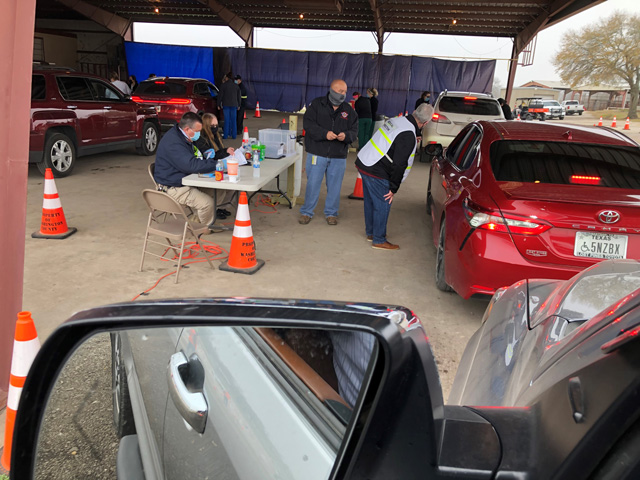Best Blog of the Week
An Urban's Rural View: No, It's Not the Equivalent of the Flu -- Yet
A year ago, as America was just being introduced to COVID-19, people I respect were predicting it would be no worse than the flu.
There are still a few people saying that but it's hard to respect what they say. The epidemic has now taken more than 450,000 American lives, more than 10 times the flu's annual toll. As many Americans have died of COVID-19 as were killed in World War II and the Korean War combined.
Yet if it's wrong to equate COVID-19 and the flu today, there are signs it could be right in the foreseeable future. Thanks to the rollout of vaccines, it seems possible that within the next year or two, COVID-19 could be reduced to the point where it poses no more terrors than influenza.
Today, with fewer than 10% of Americans vaccinated, new and highly transmissible variants of COVID-19 are spreading. Some experts think the worst of the epidemic is still ahead of us.
But as more of us are vaccinated, today's pain could turn into long-term gain. At flu-like rates, deaths from COVID-19 would decline dramatically.
P[L1] D[0x0] M[300x250] OOP[F] ADUNIT[] T[]
Some people would still die. Influenza claims 20,000, 30,000, sometimes even 40,000 lives a year. But even in bad years, flu doesn't rank among the top 10 causes of death in the U.S. (https://www.cdc.gov/…) At 450,000-plus, COVID-19 is currently the third-leading cause of death, behind heart disease and cancer.
The hopeful point is that the leading vaccines have proved in trials to be extraordinarily effective at preventing death. For example, none of the people who received the Moderna vaccine in its trial developed COVID-19 symptoms and none died. In the control group, the people given the placebo, 30 came down with severe cases and one died. (https://www.sciencemag.org/…)
This holds out hope that in the future, COVID-19 deaths will occur overwhelmingly among those who weren't vaccinated. As it becomes clear that vaccinated people rarely die, resistance to the vaccines should diminish. If this sounds outlandishly optimistic, that may be because you've read that the Pfizer and Moderna vaccines are only about 95% effective. What 95% refers to, though, is how effective the vaccines were at preventing the disease. For preventing deaths, the effective rate in the trials was 100%.
Many long months will pass before deaths come down to flu levels. Yes, the vaccine rollout is accelerating, but COVID-19's mutations are accelerating, too. Some experts think the UK variant is 50% more transmissible and will in March become the dominant strand of the disease in the U.S. (https://www.propublica.org/…)
And the UK variant itself is mutating, as South Africa has discovered to its displeasure. In Brazil, another mutation has brought a surge of cases to Manaus, a city where 75% of the population had previously been infected by COVID. (https://www.npr.org/…)
With variants starting to show up in the U.S., we all need to double down on masking, social distancing and hand washing. To give the medical system a better shot at countering the variants, the government needs to do more genome sequencing.
"We don't know how many variants are in the United States or how widespread they are, and we don't have a rapid-response system to evaluate the effectiveness of the available vaccines and treatments against them," said a group of advisors to the president's transition team. They recommend sequencing 50,000 cases a week, with a focus on those who are infected after being vaccinated or having previously been infected. (https://www.washingtonpost.com/…) The Centers for Disease Control and Prevention currently has contracts to sequence only 6,000 samples a week. (https://www.cdc.gov/…)
Yet if the present is scary, the vaccines offer promise for the future. And three new vaccines are on the way. That means more people will be vaccinated sooner rather than later.
Johnson & Johnson just asked for emergency authorization for its vaccine and promised to deliver 100 million doses in this year's first half. This one-shot vaccine is less effective in preventing the disease than Moderna or Pfizer but no one who has received it in trials has been hospitalized or died -- even in South Africa, where that troublesome mutation of the coronavirus originated. (https://www.washingtonpost.com/…) and (https://www.washingtonpost.com/…)
COVID-19 isn't going away, probably ever. But if vaccines can turn it into another flu, life really can return to something approaching normal. If the vaccines prove in practice as effective in preventing death as they did in the trials, there will be renewed respect for the view that COVID-19 is no worse than the flu.
Urban Lehner can be reached at urbanize@gmail.com
(c) Copyright 2021 DTN, LLC. All rights reserved.




